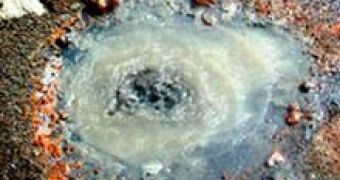When life started, around 4 billion years ago, the Earth was a significantly different place from how it is today. In the meantime life itself has radically altered both the composition of the atmosphere and the composition of the soil.
Scientists wonder where exactly did life appear. For a long time most of them believed it appeared in small puddles of water in the tropical areas. However, when they began studying deep ocean volcanoes they were surprised to find that life was teaming in the hot water around the volcano. Another hypothesis appeared: maybe this is where life first started. Maybe that the energy needed to fuel the increase in complexity did not come from the Sun after all, but from the Earth's volcanic activities.
This volcanic hypothesis gained new weight last year when the genetic analysis of bacteria (called "thermophiles") found thriving in hot springs and around hydrothermal vents on the sea floor, revealed that it is very primitive and near the base of the tree of life. These bacteria are closely related to the common ancestor of all living things.
This discovery seems to imply that it is very likely that life indeed has appeared in such places. Moreover, scientists have shown that various complex biological molecules such as peptides can spontaneously appear in volcanic-like environments engineered in the lab.
The evidence seemed very strong. However, biophysicist David Deamer of the University of California, Santa Cruz, was suspicious that maybe the volcanic-like environments created in the lab were not realistic enough. He decided to see what happens in an actual volcanic pool.
He needed to find a puddle of water heated by volcanic activity but void of any signs of life. But where could he find such a thing on today's Earth? He found one in Kamchatka on the eastern coast of Russia. Here, recent volcanic activity had erased all life. It was the perfect spot.
Deamer and colleagues added a can of "primordial soup" containing the building blocks of proteins and DNA, as well as fatty acids that could form rudimentary cell membranes. They wondered whether these ingredients could self-organize in the given conditions into more complex molecules.
However, when they sampled the water a few hours later, they were surprised to find that most of the added material had vanished. What happened to the molecules? Tests revealed that they were attracted to the clay that lined the tiny pond and stuck to it. The molecules "are nailed down, so they can't interact," Deamer says.
Thus instead of giving the final proof that life has appeared in a volcanic pool, they delivered a hard blow to this hypothesis. Hot volcanic pools may be unlikely spots for the first assembly of life's little bits, says Deamer.
Genetic studies have shown that all life on Earth has a common ancestor, thus there is only one birth place of life from which life then speared all over the Earth in the most unlikely places. The bacteria found near the deep ocean volcanoes might have moved there and adapted to the conditions there short time after life has appeared somewhere else.
The volcanic pool hypothesis isn't entirely dead. Deamer plans to repeat the study on Hawaiian volcanoes where clay may be less of a problem. Other scientists are also surprised by the result. For example lab experiments conducted by chemist James Ferris of Rensselaer Polytechnic Institute IN Troy, New York have shown that certain clays can actually facilitate biological interactions. Why didn't that happen in nature? One possible explanation is that the natural volcanic pool at Kamchatka might have been too hot and too acidic.
Picture Credit: David Deamer

 14 DAY TRIAL //
14 DAY TRIAL //